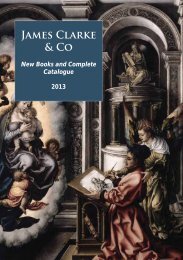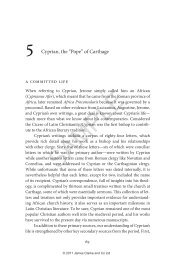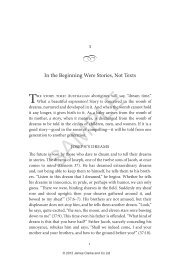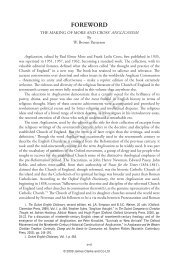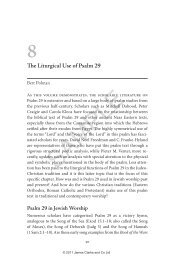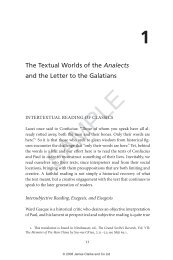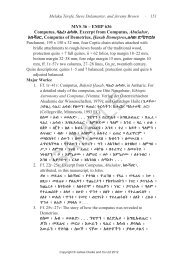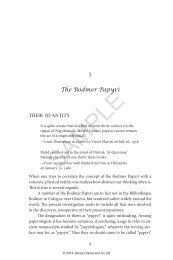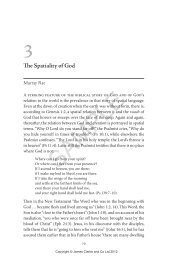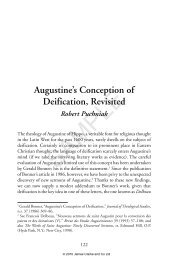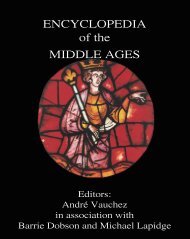Introduction by Kirk R. MacGregor - James Clarke and Co Ltd
Introduction by Kirk R. MacGregor - James Clarke and Co Ltd
Introduction by Kirk R. MacGregor - James Clarke and Co Ltd
Create successful ePaper yourself
Turn your PDF publications into a flip-book with our unique Google optimized e-Paper software.
<strong>Introduction</strong><br />
in one’s own heart the reality of God’s gracious work through one’s praxis,<br />
which could not transpire apart from one’s previous election.<br />
Chapter seven sees Francis Lyall use his unique background as a historian<br />
of law to delineate the particulars of the Pauline analogy of adoption,<br />
an analogy borrowed from Roman law instead of Jewish or Greek<br />
law, <strong>and</strong> its consequences for eternal security. Since Roman law dictated<br />
that a person could only be part of one family at a time, adoption required<br />
a change in formal legal relationship where<strong>by</strong> someone left a previous<br />
family <strong>and</strong> became part of a new family. For male citizens, three possibilities<br />
existed for family status: sui iuris or independent; a paterfamilias who<br />
headed a family under his authority; <strong>and</strong> alieni iuris or part of a family<br />
controlled <strong>by</strong> a paterfamilias (female citizens could hold either the first<br />
or third status). When a sui iuris wished to become adopted into a family,<br />
s/he would commit the detestatio sacrorum <strong>by</strong> ab<strong>and</strong>oning one’s former<br />
deities <strong>and</strong> turn to the ritual worship of the new paterfamilias; similarly,<br />
when the neophyte turns from living independently to embracing the<br />
Lordship of Christ, the neophyte departs from the idolatry of exalting selfish<br />
<strong>and</strong> nationalistic concerns to the status of ultimacy <strong>and</strong> enters a spiritual<br />
priesthood offering up sacrifices of righteousness to God the Father.<br />
The adoption of an alieni iuris spelled termination of all legal ties with<br />
the former family <strong>and</strong> placement under the absolute authority of a new<br />
father, a situation which conjures up the notion of being transported out<br />
of the household of Satan <strong>and</strong> into the household of God. In both cases,<br />
the father owned all family members, which possession involved complete<br />
provision for their well-being <strong>and</strong> total responsibility for rectifying<br />
their mistakes. Such elements are clearly mirrored in the biblical imagery<br />
of Yahweh in general <strong>and</strong> Christ in particular as the good shepherd <strong>and</strong><br />
the interrelated doctrines of forgiveness <strong>and</strong> atonement. Lyall is careful to<br />
note that while the analogy of adoption, <strong>by</strong> itself, does not dem<strong>and</strong> that<br />
God will never reject his children, for Roman law in the New Testament<br />
period lacked controls on how an adopter might behave, it strongly points<br />
in the direction of the larger Scriptural witness that God cannot disclaim<br />
members of his family.<br />
SAMPLE<br />
PART TWO: HISTORICAL AND PHILOSOPHICAL STUDIES<br />
In chapter eight, Br<strong>and</strong>on G. Withrow investigates the controversial relationship<br />
between grace <strong>and</strong> works in the authentic first epistle of Clement<br />
xxvi<br />
© 2011 <strong>James</strong> <strong>Clarke</strong> <strong>and</strong> <strong>Co</strong> <strong>Ltd</strong>



